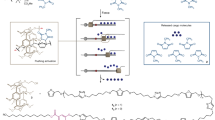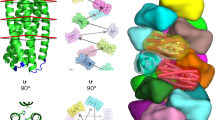Abstract
ONE of the most exciting recent developments in peptide synthesis is the introduction of the solid phase method1 which facilitates rapid synthesis of peptides by the elimination of tedious purification steps. Excess reagents are removed by filtration. The ease of these operations led to speculations that the method might be used for the synthesis of enzymes, but careful investigation has shown that the individual coupling steps are not quantitative, so that erroneous sequences accumulate, together with the desired poly peptide2,3. General methods to separate such complex mixtures are still not available, especially if the chain length exceeds 20 amino-acids, so much was clear in the attempted synthesis of the enzyme ribonuclease4 and other larger peptides. Another disadvantage of the solid phase method compared with synthesis in solution is the restriction in the choice of solvents, coupling methods and protecting groups.
This is a preview of subscription content, access via your institution
Access options
Subscribe to this journal
Receive 51 print issues and online access
$199.00 per year
only $3.90 per issue
Buy this article
- Purchase on Springer Link
- Instant access to full article PDF
Prices may be subject to local taxes which are calculated during checkout
Similar content being viewed by others
References
Merrifield, R. B., J. Amer. Chem. Soc., 85, 2149 (1963).
Bayer, E., Eckstein, H., Hägele, K., König, W. A., Brünign, W., Hagenmaier, H., and Parr, W., J. Amer. Chem. Soc., 92, 1735 (1970).
Bayer, E., in Weinstein, B., Peptides, Chemistry and Biochemistry, 99 (Dekker, New York, 1970).
Gutte, B., and Merrifield, R. B. H., Amer. Chem Soc., 91, 501 (1969).
Bayer, E., Jung, G., Halasz, I., and Sebastian, H., Tetrahedron Lett., 4503 (1970).
Bayer, E., et al., in Scoffone E., Peptides I969 (North-Holland, Amsterdam, 1971).
Halasz, I., and Sebastian, H., Angew. Chemie (Intern. ed.), 8, 453 (1969).
Shemyaki, M. M., Ovchinnikov, Y. A., and Kiryushkin, A. A., Tetrahedron Lett., 2323 (1965).
Mutter, M., Hagenmaier, H., and Bayer, E., Angew. Chemie., 83, 883 (1971).
Determann, H., Arch. Pharm., 303, 117 (1970).
Sievers, R. E., Bayer, E., and Hunziker, P., Nature, 223, 179 (1969).
Bayer, E., Hunziker, P., Mutter, M., Sievers, R. E., and Uhmann, R., J. Amer. Chem. Soc., 94, 265 (1972).
Tilak, M. A., Tetrahedron Lett., 849 (1970).
Staab, H. A., Angew. Chemie, 71, 194 (1959).
Ultrafiltration with Diaflo Membranes (Amicon N. V. Oosterhout, Holland, 1970).
Moore, S., Spackman, D. H., and Stein, W. H., Anal. Chem., 30, 1185 (1958).
Gray, W. R., and Hartley, B. S., Biochem. J., 89, 380 (1963).
Author information
Authors and Affiliations
Rights and permissions
About this article
Cite this article
BAYER, E., MUTTER, M. Liquid Phase Synthesis of Peptides. Nature 237, 512–513 (1972). https://doi.org/10.1038/237512a0
Received:
Revised:
Issue Date:
DOI: https://doi.org/10.1038/237512a0
This article is cited by
-
Low-Loaded Polyethylene Glycol (PEG) Resin for High-Purity Peptide Synthesis and Cell Binding Assays
BioChip Journal (2023)
-
How to define and study structural proteins as biopolymer materials
Polymer Journal (2020)
-
Sequence-defined multifunctional polyethers via liquid-phase synthesis with molecular sieving
Nature Chemistry (2019)
-
Sequence-controlled methacrylic multiblock copolymers via sulfur-free RAFT emulsion polymerization
Nature Chemistry (2017)
-
Peptide-Based and Polypeptide-Based Gene Delivery Systems
Topics in Current Chemistry (2017)
Comments
By submitting a comment you agree to abide by our Terms and Community Guidelines. If you find something abusive or that does not comply with our terms or guidelines please flag it as inappropriate.



